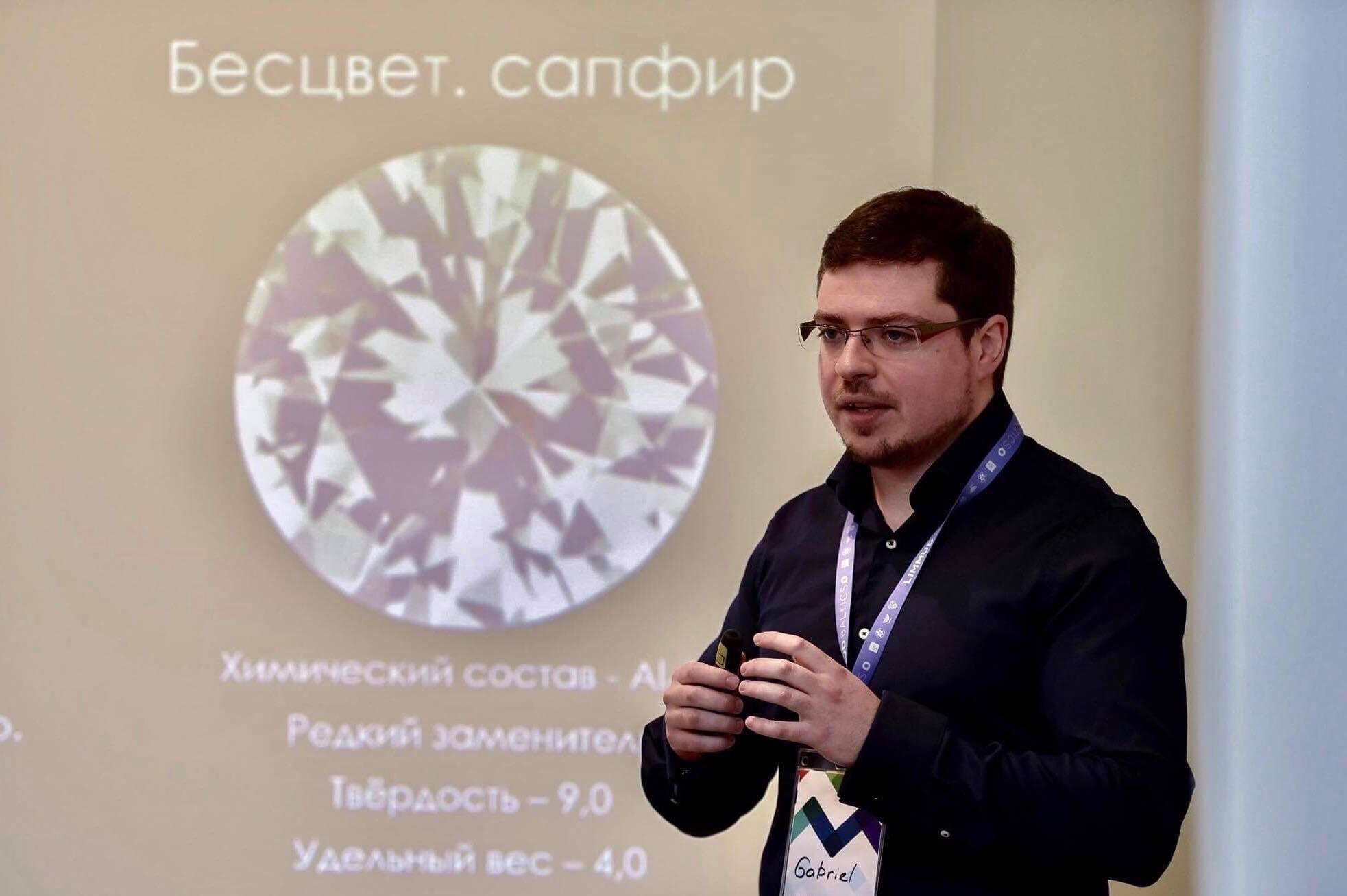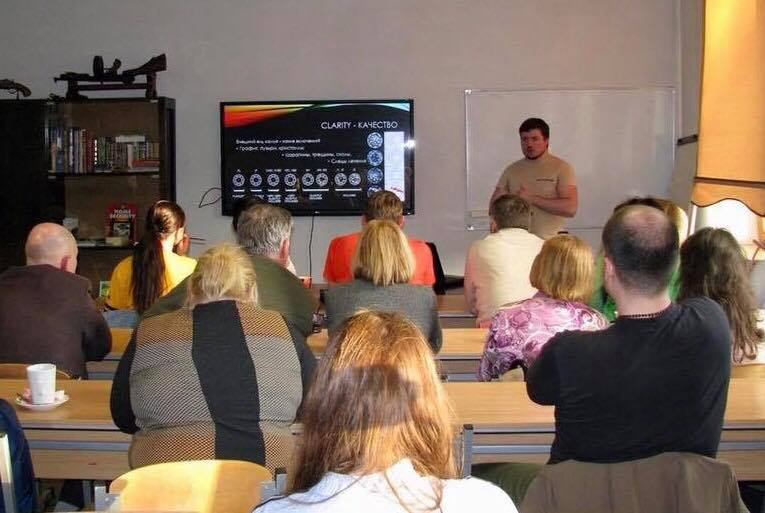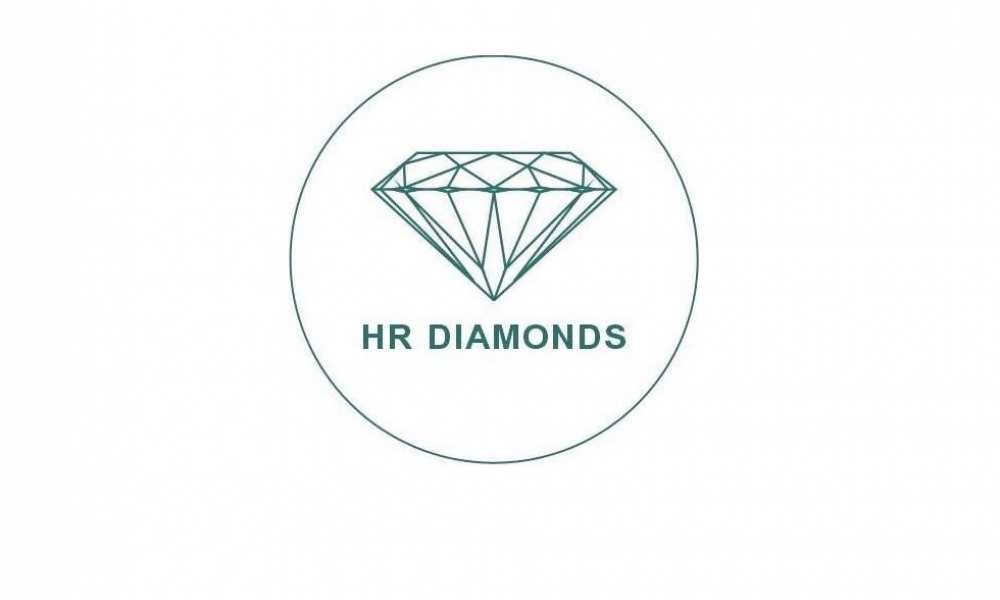This is the first article in a series about competent investing in jewelry made into plain English. The seasoned diamantaire, Mr.Gabriel Levin-Cafrir, will talk about terminology, professions, main risks and caution signals for a newcomer to make a deliberate decision when acquiring the piece of jewellery for whatever (passionate or investing, or both) reason.
Gabriel Levin-Cafrir (M.Soc.Sci), second generation diamantaire, graduate of the Center of Gemological Studies under the leadership of one of the leading Graduate Gemologists of Israel - Eli Dori, specialization - Diamond Expert (“Diamond Grading & Evaluating” diploma), at Diamond Exchange, Ramat Gan, Israel. The evaluation of diamonds is based on the G.I.A (Gemological Institute of America) standards. Practiced in Israeli commpany “Keren Or”. Works in jewellery and gemstones sales sphere (family business), consults, does lecturing.
Passion investing in jewellery. Part I: professions
I believe many of you had this awkward moment when someone, thinking that you have all the answers for his or her questions, asks your opinion or to do something in the field that you are not good at or even don’t know it.. This always happens to me.. That is why I want to make my first article in this series about main profession that you as customer may meet in a searching for a piece of a jewellery.
But first let me introduce myself. My name is Gabriel Levin-Cafrir and I am diamantaire in “HR Diamonds” company that is located in Riga, Latvia. What? Never heard of diamantaires? Well, in this case I will explain to you who we are, as well as most common professions that you will meet during a process of buying a jewellery piece.
And the one of the most common professions, of course, is jeweler.
Jeweller
- Jeweller is a person who designs, makes, sells, and repairs jewellery and watches. (Cambridge online dictionary https://dictionary.cambridge.org/; dictionary www.dictionary.com) N. B. Nowadays jewellers most often don't work with watches, only if a watch is made of precious metal and it is a piece of jewellery.
- A jeweler is an artisan who uses metals, gems and other materials to create adornments like bracelets, earrings, rings, and necklaces. They might also be called upon to repair, adjust, clean, and appraise pieces of jewelry. (Career Explorer web page https://www.careerexplorer.com/careers/jeweler/#similar-careers)
- Jeweller (also known as retail jeweller, designer etc.) covers a range of jobs which all surround the design and production of jewellery, ranging from merely designing the pieces to moulding specialist materials. The key job of a jeweller is producing designs of various types of jewellery, either by hand or using a computer program. Typically, these are types of fashion jewellery, but can also include pieces that use more specialist material including gold, silver and precious stones. (My Job Search web page https://myjobsearch.com/careers/jeweller.html)
A jeweller must have at least basic practical knowledge of gemstones (that is used in jewellery) and precious metals, their features and properties, know most popular settings, jewellery models and clasps, know which design combinations are practical and wearable, make a piece of jewellery having only a photo or drawing, find optimal solutions to it and, of course, be able to communicate with a client and answer all questions that may occur. A talented jeweler always is a design artist-constructor and creative thinker.
The types of work that jewellers do, are:
- Designing (make a new design that will differentiate or find solutions to a customer-given design with weak places);
- Model-making (with new technologies jewellers make 3D models, using which they can repeat the same model many times);
- Stone-setting (putting gemstones inside a jewellery and make sure they wont fell off is harder than it may look, there is even a special profession for such kind of task);
- Welding (jewellery pieces are regularly made from more than one type of material or material colour which need to be welded together);
- Enamelling (special process in which powdered glass is fused to a metal by heating it in a kiln, and not every jeweler is doing it);
- Electro-plating (is used to fix precious metals in place on a metal structure);
- Chasing (chasing produces raised patterns on the surface of the metal);
- Polishing (the final step in jewellery creation - making it shining like a star by removing upper layers);
- Engraving (in cases when customer is asking, or if the jeweller wants to mark his work);
- Repairing (almost all jewellery can be fixed, it is a question of time and expenses);
- Cleaning (removing all the dirt inside so that jewellery will be as good as new);
- Evaluating (giving a selling price range after jewellery detailed examination).
Based on my experience jewelers may conditionally be divided into „specializations”. This happens because each jeweler has either a talent for a certain part of his activity, or he has devoted most of his time to a certain its type. That is why there are jewelers who, for example, are best in manufacturing earrings, or just several types of earring models, others are best in making wedding rings, thirds in repairs etc.
Taking this into account, it is important to know which jeweler is best at, that is why we, as jewellery retail company, work with several jewelers, giving them only those tasks that they are good at, and keeping that in mind are always opened for cooperation with new ones.
Second profession that you will hear of is a gemmologist.
Gemmologist
Gemmologist is a gem specialists who identifies and evaluates ornamental and organic gem materials and gemstone: nature (gemstone group, etc.), origin (natural or man-made), level of damage (quantify damage to gemstones) and authenticity (all kinds of imitations, treatments) using gemological testing instruments such as refractometer, spectroscope, microscope, etc., as well as prepares special identification and appraisal reports, and have the ability to buy and sell gems.
In retail jewellery companies, gemmologists are hired as buyers, costumer consultants etc., but most of them work in laboratories, which provide various services, including assessing gems restoration and treatments (also treatment repairs). They also participate in man-made gemstone growing processes.
So, once fully trained as a gemmologist, you can work in a variety of different settings, including diamond-mining companies, gem dealers, wholesale gem buyers, valuers, auction houses, in manufacturing and retail.
As you can see, this profession includes all kind of knowledge about gemstones and gemmologists are welcomed everywhere. If you are obsessed with gemstones, in my opinion, this is a profession that is very worth it for you, but very time consuming, so you will have to be very patient and a hardworking person.
Speaking about business – jewellery and gemstone sellers. There are two main kinds of jewellery sellers: wholesaler and retailer.
Wholesaler
Wholesaler is a person or firm that buys large quantity of goods from various producers or vendors, warehouses them, and resells to retailers. (Business dictionary http://www.businessdictionary.com/definition/wholesaler.html)
A diamond wholesaler is someone who buys diamonds from miner companies in bulk and then sells them in big amounts to retail companies. A diamond wholesaler sales gemstones to retailer based on pricing list called the Rapaport Diamond Report which shows the average prices of different shapes, color (from D to Z), clarity and carat weight diamonds. Wholesalers don’t usually sell to the public or individual buyers unless it’s a friend or a friend’s friend, that is why it is a bad idea to look for them personally, because in the best scenario they will refuse to spend their time on you, and in worst - you will meet a deceiver.
Retailer
Retailer is a person (or company) who sells goods in small lots to the final customer, and are the middleman between wholesalers and customers. (Key Difference web page https://keydifferences.com/difference-between-wholesale-and-retail.html)
A retailer in jewellery and gemstone sphere is person who works in a jewellery store selling precious items like engagement rings, earrings, pendants etc. Well, they are necessary middlemen, the links between wholesaler and ordinary customers, because, as I explained earlier, it is very rare that wholesaler will sell someone from outside something especially in small amounts or by pieces (the impossibility of buying goods from miners I don’t even mention).
The next advantage of shopping at a retail store is you get the bought item in a spot and take it home same day and don’t need to wait for a package to come by mail.
The third advantage is that during the purchase you communicate with specialists who help consumers to choose from the varieties of precious items the one that fits his or her taste, style and budget the most.
Some retailer shops have jewellery repairing and ring resizing services, but not all. Some will send you to a jeweller. But, if you bought from a store and your item should be repaired after several days (according to the customer laws of the specific country), they have to make their job done.
Speaking about returning the goods, some of the stores won’t accept jewellery and gemstones back from customers after the purchase (because of fear of gemstone replacement with simulants, unrepaired hidden damage etc.) and this is written in their selling policy, so be sure to ask about this aspect before buying.
Nowadays most jewellery stores are selling online. It saves a lot of time for the customer, but in my opinion, this method should be used only to find out what kind of items each stores can offer. I advice first to make a research about stores reputation, level of service, retailers knowledge level (the bigger part of retailers have basic knowledge and higher, but there are retailers, and I met in my life some, who don’t even know how to read diamond colour and clarity parameters that are written on a tag.. of course serious brands won’t let that happen), all possible feedback, then choose what you like, make a call to know for sure if the chosen item is still available and then go to the store and see it in real life (this steps will help you to get rid of several mistakes as well).
But there is a third, important and popular - my profession – diamantaire.
Diamantaire
Diamantaire – the word has a french origin and two main meanings („Definitions” web page https://www.definitions.net/definition/diamantaire):
- An expert in the cutting of diamonds into gems - sometimes referred to as a "gem-quality diamond manufacturer or producer", "master diamond cutter" and a "graduate gemologist." Such individuals demonstrate considerable expertise in different types of gemstones, particularly when it comes to increasing the value and quality of a rough or raw diamond. They are highly-skilled craftsmen or artisans who are responsible for cutting, polishing and transforming a rough diamond into a finished gemstone ready for setting.
- A member of diamond dealing family or group who have established themselves in the upper echelons of the world diamond industry hierarchy, diamond dealer.
De Beers united those two meanings in very precise one: “diamantaire is a person who possesses diamond-related skills.” (De Beers Glossary web page https://www.debeersgroup.com/a-diamonds-journey/glossary/d/diamantaires).
The second definition of two mains is my case, but I want to specify it. The term „diamantaire” is used to describe a diamond dealer who is an expert in diamond grading and evaluating (otherwise he may be charlatan that can deceive even not knowing about that by himself.. well, in modern world everyone sees themselves as experts in every field). Diamantaires not only can be dealers (a person or a business organization who is engaged in buying and selling of a particular kind of goods, the middleman between the distributor of goods and the consumer, and sells in the particular area - Key Difference web page https://keydifferences.com/difference-between-dealer-and-distributor.html), but also distributors (a person or business organization who is involved in supplying goods to dealers and other businesses, an intermediary, agent, between the producer of the products and its dealers - Key Difference web page https://keydifferences.com/difference-between-dealer-and-distributor.html) or sometimes a mix.
Diamantaire mainly sells loose diamonds (sometimes other gemstones and jewellery) to customers such as individual customers, individual jewelers, jewellery shops etc. As an expert he will charge a certain percent from the wholesale price but believe me it is worth it, at least because he will save you from tremendous mistakes that can occur. Like in a retailer shops the second big advantage of shopping from a diamantaire is that you see what you are buying and can examine the item so the purchase would be without any risk and doubt, as well you communicate with dealer that will answers all your questions and help to choose most suitable option for you.
~~~~~~~~~~~~~~~~~~~~~~~~~~~~~~~~~~~~~~~~~~~~~~~~~~~~~~~~~~~
Of course, there are many more professions in gemstone and jewellery sphere, like gemcutters, engravers, stonesetters etc., but my goal was to cover those, who’s services you, as an ordinary customer, may use.
Now you know the differences between those professions, and if you are interested in gemstones and want to work in this field, I hope this article will help you to choose from. But before you start your learning, search carefully for universities, compare courses requirements etc. and remember, not a diploma will show your level of skills and knowledge, but only practice. As much as you are in it, as more valuable specialist you would be. There is never enough learning!



Links that are used to write this article:
- Blue Nile web page https://www.bluenile.com/blog/diamond-jewelry/expert-gemologist
- Business Dictionary web page http://www.businessdictionary.com/definition/wholesaler.html
- Cambridge Dictionary web page https://dictionary.cambridge.org/
- Canadian Institute of Gemmology web page https://www.cigem.ca/about/what-is-a-gemmologist
- Career Explorer web page (jeweller) https://www.careerexplorer.com/careers/jeweler/#similar-careers
- Career Explorer web page (gemmologist) https://www.careerexplorer.com/careers/gemologist/#what-is-a-gemologist
- Collins Dictionary web page https://www.collinsdictionary.com/dictionary/french-english/diamantaire
- Creative & Cultural Skills web page https://ccskills.org.uk/careers/advice/article/gemmologist
- De Beers Group web page https://www.debeersgroup.com/a-diamonds-journey/glossary/d/diamantaires
- Definitions web page https://www.definitions.net/definition/diamantaire
- Diamond Hedge web page https://www.diamondhedge.com/public/blog/wholesaler-vs-retailer-buying-a-diamond-engagement-ring/
- Dictionary web page www.dictionary.com
- Gem Society web page https://www.gemsociety.org/article/guide-career-options-gemology/
- Good Universities Guide web page https://www.gooduniversitiesguide.com.au/careers-guide/browse/gemmologist
- Key Differences web page (dealer vs distributor) https://keydifferences.com/difference-between-dealer-and-distributor.html
- Key Differences web page (wholesaler vs retail) https://keydifferences.com/difference-between-wholesale-and-retail.html
- Market Business News news page https://marketbusinessnews.com/financial-glossary/wholesaler-definition-meaning/
- My Job Search web page https://myjobsearch.com/careers/jeweller.html
- United States Department of Labor, Bureau of Labor Statistics web page https://www.bls.gov/ooh/production/jewelers-and-precious-stone-and-metal-workers.htm#tab-2
- Your Dictionary web page https://www.yourdictionary.com/diamantaire

